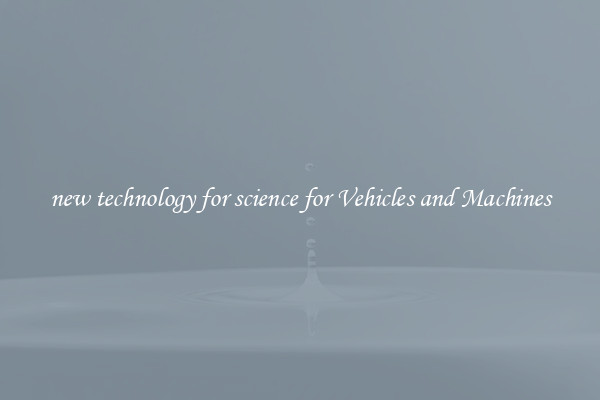new technology for science for Vehicles and Machines
New Technology for Science: Revolutionizing Vehicles and Machines

In today's fast-paced world, scientific advancements continue to revolutionize various industries. Among these sectors, vehicles and machines have always played a crucial role. Whether it is exploring unknown territories, transporting goods, or carrying out complex tasks, these progressive technologies have always been at the forefront. Now, with the dawn of new technologies for science, vehicles and machines are poised to experience a wave of transformative innovations.
One of the most promising technologies on the horizon is autonomous vehicles. These vehicles are equipped with advanced sensors and artificial intelligence, allowing them to operate without human intervention. The potential for autonomous vehicles is immense, particularly in terms of safety and efficiency. With enhanced sensing capabilities, they can detect obstacles and react instantly, minimizing the risk of accidents. Moreover, autonomous vehicles can optimize routes and operate with optimal fuel efficiency, reducing emissions and providing cost savings in the long run. This groundbreaking technology not only has the potential to redefine transportation as we know it but can also revolutionize industries such as shipping and logistics.
Another exciting technology making its mark is robotics. Robots have come a long way from being confined to industrial settings. With advancements in artificial intelligence, machine learning, and sensors, robots are becoming more versatile and capable of performing complex tasks. For instance, in the field of medicine, surgical robots are being used to perform minimally invasive procedures with unparalleled precision, reducing patient recovery time and improving outcomes. Similarly, in the agriculture industry, robots are being employed for tasks such as planting, harvesting, and monitoring crops, leading to increased yields and reduced reliance on manual labor.
Furthermore, the emergence of electric vehicles (EVs) brings tremendous potential for a more sustainable future. With the global imperative to reduce greenhouse gas emissions, the automotive industry has shifted its focus towards EVs. These vehicles are powered by electricity, eliminating the need for fossil fuels and significantly reducing carbon emissions. In addition to being environmentally friendly, EVs offer numerous advantages, including lower operating costs, reduced noise pollution, and improved energy efficiency. As technology continues to advance, the range and charging speed of EVs are improving, making them more practical and appealing to consumers.
Lastly, advancements in material sciences have also contributed to significant breakthroughs in vehicle and machine technology. Lightweight materials such as carbon fiber composites are being used to manufacture vehicles that are not only fuel-efficient but also possess superior strength and safety features. Smart materials, on the other hand, are capable of transforming their properties according to external stimuli, demonstrating potential for applications in various industries.
In the fast-paced world of vehicles and machines, scientific advancements are continuously shaping the future. From autonomous vehicles to robotics, electric vehicles, and new materials, these technologies hold immense potential. As we embark on this exciting journey, it is essential to embrace and support these innovations, which offer a promising future for safer, more efficient, and sustainable vehicles and machines.

View details

View details

View details

View details








